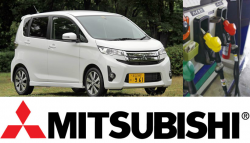
— Saying "improper manipulation" occurred to give the appearance of better fuel consumption rates, Mitsubishi says all models sold in Japan have the wrong fuel economy based on incorrect tests performed for the past 25 years. Additionally, the automaker says other models no longer sold in Japan were sold with the wrong fuel economy values.
In the beginning, Mitsubishi said problems were found with the 600cc Mitsubishi eK Space, eK Wagon, and Nissan Dayz and Dayz Roox minicars, but the addition of nine models means all models in Japan have incorrect fuel consumption values.
Mitsubishi says the problem goes back to 1991 when the automaker admits it used incorrect testing methods for its cars. Under the Road Transport Vehicle Act, "driving resistance" is required to be verified by a "coasting test," but Mitsubishi says it has always used a "high-speed coasting test," something that gives inaccurate results.
The automaker says a relatively low value was selected from among the test results for use as the driving resistance value in order to give the appearance of better fuel consumption values.
Mitsubishi was reminded in 2007 about proper test procedures when the testing manual was updated and included wording that specifically said only the "coasting test" could be used for vehicles sold in Japan. However, Mitsubishi says it continued to use the high-speed coasting test in violation of Japanese standards.
The automaker says fuel consumption targets were raised five times because of an "overly optimistic outlook" caused by a "deep concern" regarding competitor fuel consumption levels. The company says insiders knew "realistic attainment of the targets was problematic."
While managers and executives requested improved fuel consumption targets that couldn't be met, certain employees knew the subject of fuel consumption was equated with whatever factor provided the most appeal during marketing.
Mitsubishi says although managers knew of the problematic high fuel consumption targets, those managers in development-related departments didn't confirm the truth to subcontractors involved in the process.
The automaker could possibly be required to pay $1 billion in payments to customers for compensation. However, Mitsubishi won't be forced to repay Nissan, even though many affected vehicles were manufactured by Mitsubishi for Nissan.
It was first believed Nissan would be compensated for the fraud, but instead, Nissan has agreed to throw in $2.2 billion to buy a third of Mitsubishi Motors. Under Japanese shareholder laws, this will give Nissan control of its smaller former rival.




